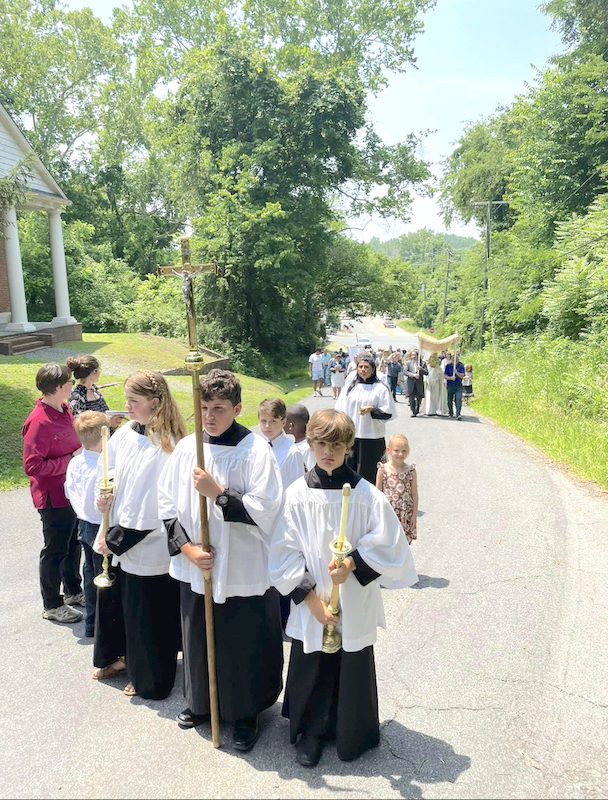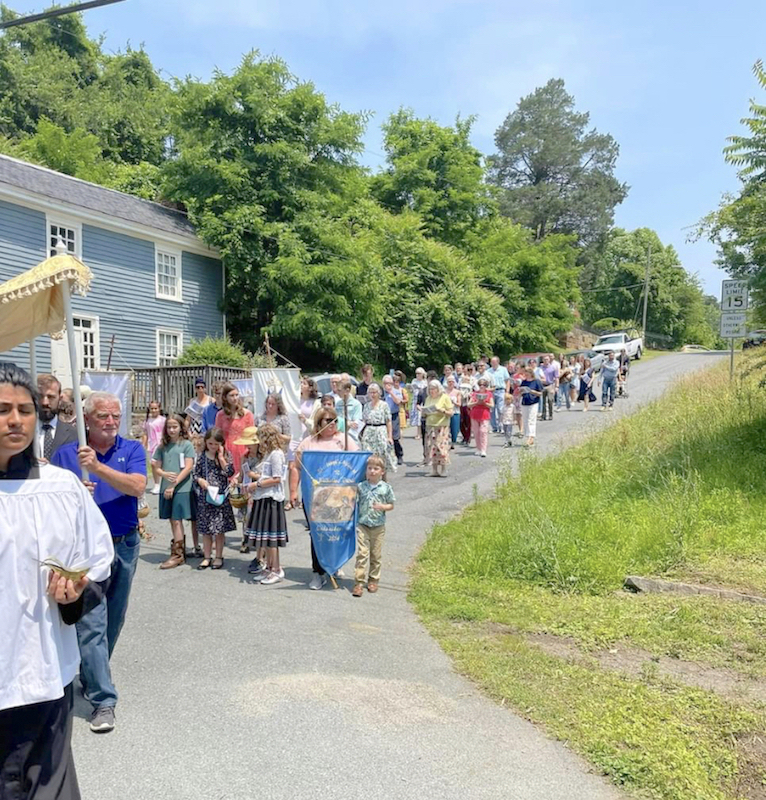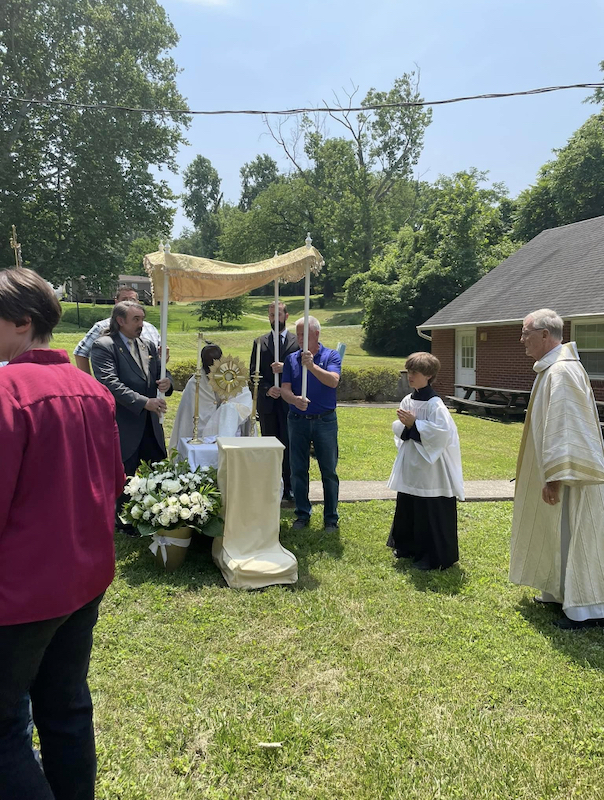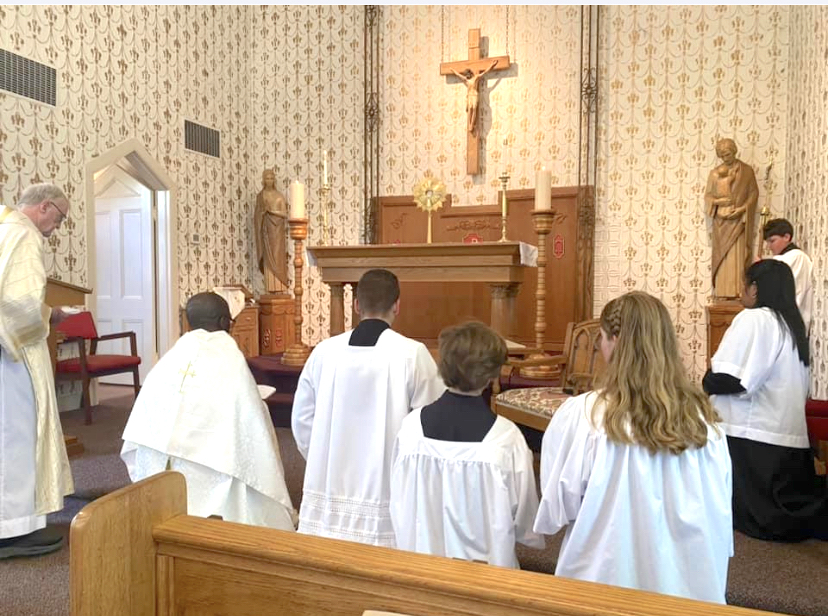Parish shapes ‘several generations of Catholic families’ over last 140 years
Nestled in Fluvanna County, Columbia is a small community of fewer than 100 residents. What it lacks in population it makes up for in congregation, as evident by its beloved Catholic church, St. Joseph/Shrine of St. Katharine Drexel.
St. Joseph has more parishioners than Columbia has residents, with people traveling from outside of Columbia to worship. The church will mark its 140th anniversary in 2024 and is spending all year celebrating the milestone.

On June 11, the Feast of Corpus Christi, parishioners and visitors participated in a eucharistic procession through the town.
Melissa Kenney has been a parishioner of St. Joseph for 16 years and is also the chair of the Anniversary Committee. “I’ve been Catholic my entire life, and this is by far the most wonderful parish I have been a member of,” she said.
“The two things that make this community special are the people and the history of the parish. The history of the church is truly marvelous; a tiny gem tucked away that truly shaped the lives of several generations of Catholic families,” added Kenney.
Becoming St. Katharine Drexel
Mother Katharine first noticed it while riding a train from Richmond to Lynchburg: a gilded cross peeking out through the trees at a stop in Columbia. She wondered if a Catholic chapel was nearby, though Catholics were scarce in rural Virginia at the turn of the 20th century.
Still, the cross stayed on her mind. Thanks to a chance encounter with a local student, Mother Katharine soon discovered there was a Catholic chapel in Columbia, named Wakeham Chapel, but it was no longer in use.
Father Richard Wakeham had built the chapel in 1884 for his parents, who had had to journey to Richmond for Mass because there was no Catholic church nearby. He celebrated Mass there until he was transferred to Boston in 1892.
When Mother Katharine went to investigate the building, she found a man sweeping the floor. He called himself “Uncle Zeke” and said he cleaned the chapel daily out of respect for Father Wakeham, and he also prayed daily for Mass to return to Columbia. With Mother Katharine’s help, it did.
Katharine Drexel was born a wealthy heiress, the daughter of a prominent banker in Philadelphia. Her family was extremely devout and often gave food, medicine, money, and clothes to those less fortunate.
She was very concerned with the inequality she saw in minority (particularly Native American and African American) communities, especially in terms of children’s limited access to education. In 1878, she traveled to Rome where she implored Pope Leo XIII to send more missionaries to the United States.
He suggested that Katharine become a missionary herself, and, after much thought, she did. She gave up her life of luxury, founding the Sisters of the Blessed Sacrament in 1891 as an order devoted to social justice causes.
In Columbia, she set up a one-room schoolhouse to educate local Black children. She donated nearly $20 million of her own inheritance to directly fund dozens of other missions and schools across the country.
She also founded Xavier University, the first and only historically Black Catholic university in the United States.
Now Mother Katharine is known as St. Katharine Drexel, patron saint of racial justice and philanthropy, and one of the first saints to be born in the United States. Her impact is still being felt in Columbia and beyond.
Shrine to St. Katharine
Though the chapel was unofficially known as St. Joseph for many years, the name of the chapel officially changed from Wakeham Chapel to St. Joseph’s Chapel in 1939. It remained a mission church until 1967 when the Diocese of Richmond took it over.
Two weeks after St. Katharine was canonized by Pope John Paul II in 2000, former Bishop Walter F. Sullivan renamed the church St. Joseph/Shrine of St. Katharine Drexel, one of only two shrines dedicated to her in the nation.
In honor of St. Katharine’s important place in parish history, a memorial grotto to her was built in 2006 with funds raised by the parish.
Father David Ssentamu has served as pastor since 2019. He was born and raised in Uganda, becoming a priest in Africa before moving to the United States. He arrived mere months before the pandemic hit.
“St. Joseph has always been a parish where you make the best of the situation you have, and COVID was no exception,” said Kenney.
It was Father Ssentamu’s idea to commemorate the 140th anniversary of the church – a year packed with events to make up for the past three years of COVID.
Generations of history
St. Joseph’s focus on youth involvement hasn’t waned from St. Katharine’s time. Parents pass the torch of faith down to their children, who later pass it on to their own children. This is one of the reasons why Kenney thinks the church has lasted so long.
“All throughout the history of St. Joseph, children have been a priority: from educating kids at our one-room schoolhouse for nearly 50 years, to our many years of serving the cadets of Fork Union Military Academy, to today,” she said.
“We have children who are active participants as altar servers, ushers, lectors, and cantors,” added Kenney.
Many of St. Joseph’s families have been members for generations, their personal histories intertwined with that of the parish’s.
Missionary Lydia O’Hare Nicholas taught at the schoolhouse for 47 years until it closed in the 1950s. In contrast to St. Katharine, Nicholas was not the daughter of wealthy parents, but of freed slaves.

Her descendants are current parishioners of St. Joseph. Nicholas was awarded the Papal Medal of Honor, the highest honor a lay woman can receive from the Vatican.
Black families like O’Hare’s joined St. Joseph at a time when many places were segregated, finding the church a refuge from racism. It remains a diverse parish with parishioners of differing ages and ethnicities.
“It is a small community of people from various underserved people, who know the struggles they had and want to help others in similar situations,” Deacon Robert Allen said.
What Deacon Allen remembers most about joining St. Joseph 12 years ago is how he too was welcomed into the community.
“It is a close-knit parish with a lot of pride in their existence and their willingness to work together as a team in making St. Joseph a welcoming place of worship to whomever enters the doors,” he said.
Deacon Allen also spoke of how important it is for St. Joseph parishioners to know the history of their church and to remember where they came from.

(Photo/Melissa Kenney)
“I think it’s important, whether for a church or us personally, to know the history, the challenges, the struggles, the good and the bad, that have led us to where we are today,” he said.
St. Joseph’s celebratory year continues until March 2024. Anniversary events include a parish homecoming; a visit to the Wakeham family cemetery; participating in Fluvanna’s Columbia Day celebration; and learning more about the parish’s past from some of its oldest members.
“My hope for the future of the parish is that it continues to survive and thrive,” said Kenney. “My other hope is that people learn the rich history of this parish and continue to hand it down. The 140th anniversary is a great start to that.”
To learn more about St. Joseph, please visit saintjosephcolumbia.org

